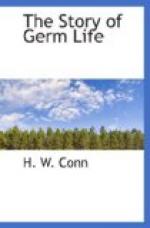In the first place, we may notice the value of these organisms simply as scavengers, keeping the surface of the earth in the proper condition for the growth of animals and plants. A large tree in the forest dies and falls to the ground. For a while the tree trunk lies there a massive structure, but in the course of months a slow change takes place in it. The bark becomes softened and falls from the wood. The wood also becomes more or less softened; it is preyed upon then by insect life; its density decreases more and more, until finally it crumbles into a soft, brownish, powdery mass, and eventually the whole sinks into the soil, is overgrown by mosses and other vegetation, and the tree trunk has disappeared from view. In the same way the body of the dead animal undergoes the process of the softening of its tissues by decay. The softer parts of the body rapidly dissipate, and even the bones themselves eventually are covered with the soil and disintegrated, until in time they, too, disappear from any visible existence. This whole process is one of decay, and the result is that the solid mass of the body of the tree or of the animal has been decomposed. What has become of it? The answer holds the secret of Nature’s eternal freshness. Part of it has dissipated into the air in the form of gases and water vapour; part of it has changed its composition and has become incorporated into the soil, the final result being that the body of the plant or animal disappears as such, and its substance is converted into gaseous form, which is dissipated in the air or into simple compounds which sink into the earth.
This whole process of decay of organic life is one in which bacteria play the most important part. In the case of the decomposition of the woody matter of the tree trunk, the process is begun by the agency of moulds, for this group of organisms alone appears to be capable of attacking such hard woody structure. The later part of the decay, however, is largely carried on by bacterial life. In the decomposition of the animal tissues, bacteria alone are the agents. Thus the process by which organic matter is dissipated into the air or incorporated into the soil is one which is primarily presided over by bacterial life.
Viewing this matter in a purely mechanical light, the importance of bacteria in thus acting as scavengers can hardly be overestimated. If we think for a moment of the condition of the world were there no such decomposing agents to rid the earth’s surface of the dead bodies of animals and plants, we shall see that long since the earth would have been uninhabitable. If the dead bodies of plants and animals of past ages simply accumulated on the surface of the ground without any forces to reduce them into simple compounds for dissipation, by their very bulk they would have long since completely covered the surface of the earth so as to afford no possible room for further growth of plants and animals. In a purely mechanical way, then, bacteria as decomposition agents are necessary to keep the surface of the earth fresh and unencumbered so that life can continue.




